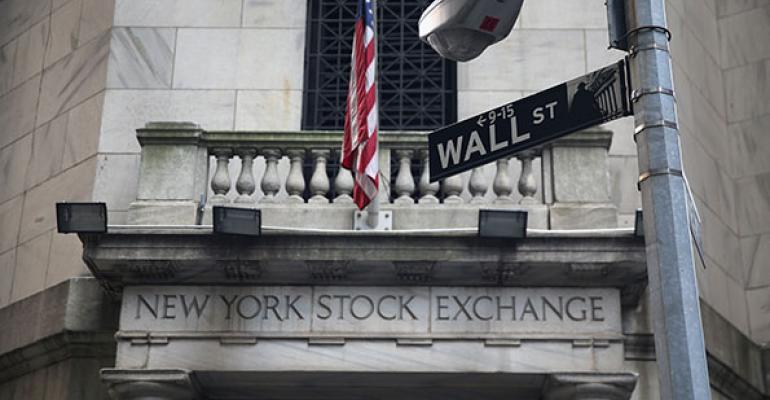By Jesse Hamilton and Robert Schmidt
(Bloomberg) --As President-elect Donald Trump’s hiring spree captivates White House watchers, the biggest banks are laser-focused on a little-known position that’s neither a cabinet job nor the head of a government agency: a first-ever Federal Reserve vice chairman to oversee Wall Street.
Trump’s transition advisers are already gathering names for the post established by the Dodd-Frank Act, a sign that there’s at least one part of the law he may not try to eviscerate. The supervision chief is responsible for Fed regulations and arguably has the most sway of anyone in Washington over how firms like Goldman Sachs Group Inc., JPMorgan Chase & Co. and Morgan Stanley run their businesses. Should Trump fill the job, his choice would have huge influence on whether banks succeed in dialing-back financial rules.
“The most important appointment for Wall Street banks” is the head of supervision, said Mark Calabria, director of financial regulation studies at the Cato Institute. “The Federal Reserve has come out of Dodd-Frank as an uber-regulator.”
President Barack Obama never named anyone to the position, because it became clear he’d have a hard time getting someone through the Republican-controlled Senate. If someone was appointed under President-elect Trump, one of the sharpest thorns in Wall Street’s side would be removed: Fed Governor Daniel Tarullo, who has handled supervision unofficially in the six years since Dodd-Frank’s approval.
‘Alpha Dog’
Tarullo, once labeled the “alpha dog” of financial regulators by a lawmaker, has spearheaded some of the toughest restrictions imposed on banks globally in response to the 2008 financial crisis. He’s led the Fed’s annual stress testing and the day-to-day monitoring of risks to the financial sector, and he’s advanced rules on capital that exasperated bankers. Tarullo’s tenure has been defined by the goal of making Wall Street safer, an approach that the industry argues has gone too far in curtailing risk-taking that’s needed to drive the economy.
While Tarullo can remain on the Fed board, his dominion over big banks would end as soon as the Trump administration got a supervision chief confirmed. Several names of candidates who could replace Tarullo have come up in talks between Trump’s advisers and those they’ve consulted with, said people familiar with the matter, who asked not to be named because the discussions were private.
The list includes John Dugan, a former Comptroller of the Currency who now advises banks on regulations; David Nason, who worked for the Treasury Department during the crisis and is now chief executive officer of GE Energy Financial Services Inc.; Randall Guynn, a top banking lawyer at Davis Polk & Wardwell who once clerked for Supreme Court Justice William Rehnquist; and even the former Securities and Exchange Commission member advising Trump on financial-regulation appointments, Paul Atkins, who runs Washington consulting firm Patomak Global Partners. Most were in government posts during the 2008 meltdown, and the other, Guynn, was helping lenders such as Citigroup Inc. and Morgan Stanley navigate the storm.
Worrisome Bankers
Another name being discussed that could be worrisome to bankers is Thomas Hoenig, the vice chairman of the Federal Deposit Insurance Corp. A former president of the Kansas City Fed, he’s been among the most prominent advocates for tougher bank capital rules and for splitting firms’ investment activities from their government-backed lending units -- a position that Trump has advocated and that sometimes overlaps with views of bank-bashing politicians such as Senator Elizabeth Warren. Hoenig gave a speech last week that read like a Fed governor’s remarks, complete with his views that interest rates need to be raised.
The potential candidates either declined to comment or didn’t respond to requests for comment.
Leverage Lets Banks Invest Like Crazy, and Also Crash: QuickTake
Tarullo, whose board term doesn’t end until 2022, has publicly said he’s still got work to do at the Fed, but he hasn’t directly addressed whether he’ll stay for any period of time during the next administration. Eric Kollig, an Fed spokesman, declined to comment.
Though the Fed is only one of several regulators overseeing the largest U.S. financial firms, it has the most extensive reach. Since Tarullo joined the Fed in 2009, it has instituted broad new demands for capital that especially targeted the biggest lenders, crated the Volcker Rule ban on certain investments and set requirements that firms stockpile easy-to-sell assets.
The Fed is also close to finishing a major rule that requires banks to hold a lot of debt that could fund the resurrection of a lender after it fails, and the agency is among those getting ready to sign off on broad new limits on Wall Street bonus pay.
On the campaign trail, Trump frequently argued that government red tape was stifling the economy, and his official transition website says the incoming administration wants to dismantle Dodd-Frank.
Yellen Opposition
While the Fed supervision chief would likely be a key role for regulating banks under Trump, the job still doesn’t carry the clout that Janet Yellen wields as chairman. So if Trump’s vice chairman tried to weaken Dodd-Frank, the official could face a tough first year should Yellen fulfill her promise to stick around until January 2018. Yellen has typically backed Tarullo’s efforts to approve tough regulations.
Stephen Myrow, a former Treasury Department official who is now managing partner of Beacon Policy Advisors in Washington, isn’t holding his breath for a major relaxation of Wall Street rules. While the inaugural vice chairman for supervision will probably arrive with a “completely different world view” than Tarullo, that doesn’t mean that annual hurdles like the stress tests will get easier.
“It is not going to be better than now,” Myrow predicted. “It is just not going to get worse.”
--With assistance from Elizabeth Dexheimer. To contact the reporters on this story: Jesse Hamilton in Washington at [email protected] ;Robert Schmidt in Washington at [email protected] To contact the editors responsible for this story: Jesse Westbrook at [email protected] Alexis Leondis





